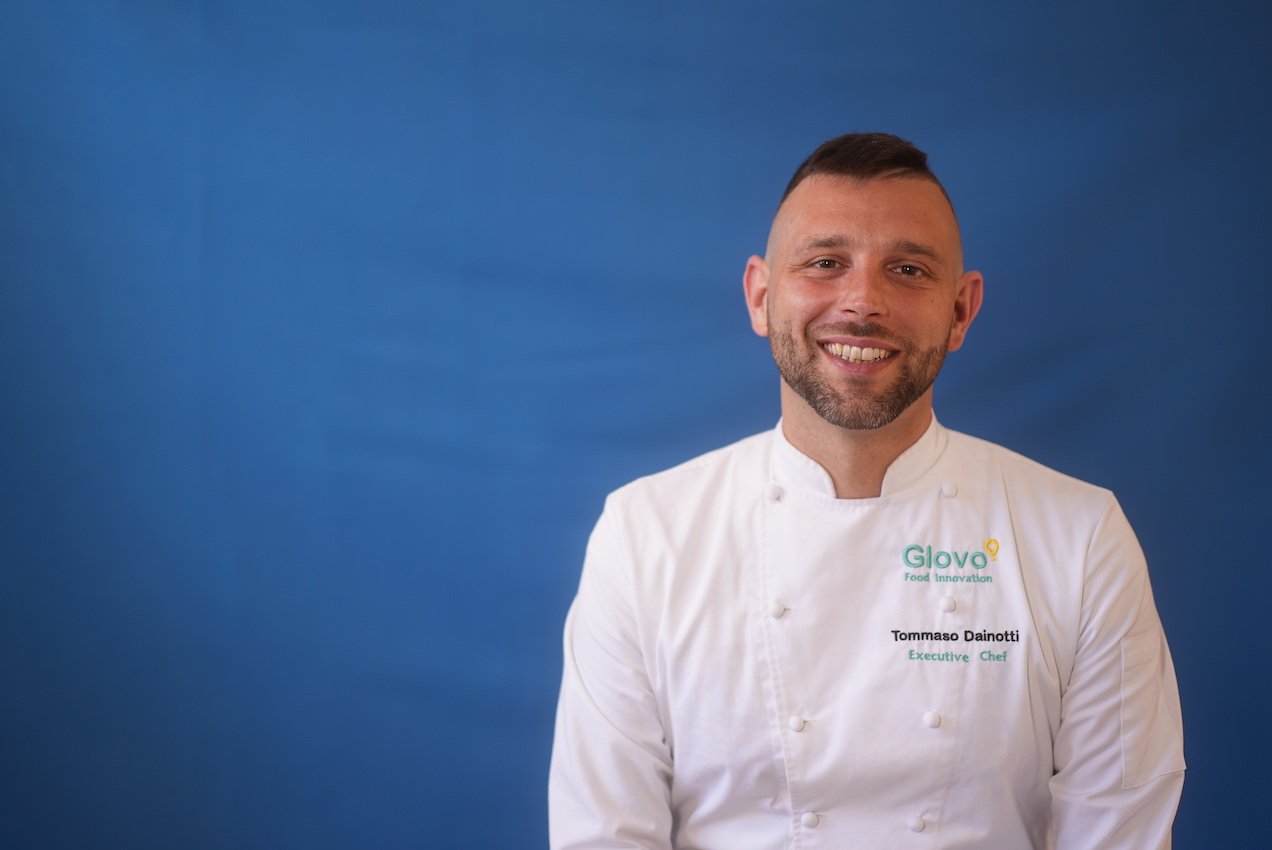Today we want to tell you the story of a young man who stumbled into the restaurant world a bit for fun and then fell madly in love with it.
From his part-time job in a restaurant to "round up" through his studies at ALMA, International School of Italian Cuisine, to today, we tell you the story of Tommaso Dainotti, Executive Chef for Glovo Concepts.
How to turn a love of cooking into a success story
Having gone from student to Executive Chef in just 5 years, Tommaso traveled, changed cities and professions, then found the right path that led him to become the professional he is today.
We hope that the path taken by Tommaso Dainotti, step by step, can help other enthusiasts in the hospitality and fine dining industry pursue their dreams as well.
In an exciting interview with Hosco, Tommaso tells us about his passion for cooking and no, not just Italian cooking!
But, before we get started, do you know what exactly an Executive Chef does? Check out our article on how to become an Executive Chef.
"Executive Chef for Glovo" isn't exactly a position you hear of every day-help us understand a little of what it's all about!
I work as Executive Chef for Glovo Concepts, a Glovo project in which we are dedicated to building virtual brands that we franchise to our partners.
As Executive Chef, I head the entire culinary department and work with my team to come up with new recipes, prepare operator manuals, and training materials so that other restaurateurs can reproduce the dishes we create.
If you had to choose one word to define your job position, what would it be?
I would say "resilience". The world of cooking is extremely dynamic, it takes a great deal of adaptability. You must always be ready to find new solutions and be open to changing things up along the way.
What if you had to choose one word to describe your love for the hospitality industry?
It would certainly be "inclusion". I always say that we do the best job in the world because we are given the opportunity to make customers happy on a very intimate level, by feeding them.
Inclusion on both a human level, through the relationship with customers, and a professional level: we include our cultural background in our cooking. These techniques, ingredients, and stories tell a tale about us, the places we’ve visited, and what each person has taught us.
Who or what has inspired your career and what is the most helpful advice you have received?
As a chef, my greatest inspiration is actually what comes every day, when I go to the market, see and touch different ingredients.
On a professional level, however, are the mentors I have had, as well as all those successful businesses built by great chefs and entrepreneurs who have been able to adapt to new business models.
The most useful advice I was ever given was to travel. Only by following the advice to travel was I able to take advantage of and implement all the other lessons I had received over the years.
Traveling teaches you to keep a humble and open mind. And this is how your desire to learn and discover new things will always remain constant, giving you the opportunity to grow and improve every day.
Want to hear Chef Tomasso's story in his own words? Check out the video interview with him on Hosco's Instagram profile and be sure to follow us for more great hospitality content!
The importance of training to grow professionally
Tommaso tells us about how his career as a chef began somewhat by accident and the life choices that led him to be who he is today.
What was the key moment that completely changed your life?
Definitely, the turning point for me was when, in my early 20s, I jumped, almost for fun, into working weekends in a restaurant
From there I fell in love: I realized that having ingredients in my hands and cooking was what I wanted to be the main part of my life, so I decided to leave my old job in the office to enroll in Alma and turn what had started a bit as a joke into my professional future.
You studied at ALMA, International School of Italian Cuisine. How has this educational experience helped you build your future as an executive chef?
I firmly believe that training is important for any profession and in any field.
ALMA helped me enhance my skills, specialize and grow professionally.
It is a training course that I would recommend to anyone regardless of their level of experience: whether you have a background in hospitality or not, ALMA is an almost assured investment in the sense that you do it willingly and it quickly gives you all the tools you need to be able to launch yourself into the all-around restaurant business.
Has being part of a community of school alumni within the world of Hosco been helpful to you? Do you see Hosco as a tool for further career development?
I’ve continued to use the services offered by Hosco after school to keep in touch with my fellow students, create new connections, and keep up to date with job openings and market trends a little bit from all countries around the world.
I will definitely still lean on Hosco in my career. At the moment I am very happy with where I am and I consult it from time to time just to keep myself updated, however, when the time comes for me for a new challenge, I will definitely look on the platform.
While it is true that the restaurant industry often goes by word of mouth, many modern businesses don't, so leaning on Hosco for job openings, networking, and keeping up to date with industry news can be an important tool, and that is why I would recommend it to everyone.
The inevitable transformation of the hospitality industry following the 2020 crisis
The Covid-19 pandemic and the 2020 health and economic crisis have affected us, first as people and then also as workers. Many sectors have been severely tested in recent years, thus finding themselves faced with a choice: let go or reinvent themselves completely.
The hospitality sector has been hit hard by the crisis, with a loss of more than 50 percent of staff to turnover.
Finding its back against the wall, The hospitality world certainly could not pick up where it left off, a simple "restoration" would not be enough to get the industry back on its feet, a complete transformation was inevitable, perhaps the biggest the industry has seen since the arrival of the Internet
So, we wanted to ask for the expert perspective of an industry professional like Tommaso.
How have you experienced the crisis in recent years and how is the hostelry industry evolving as a result of the crisis?
We cannot deny that the crisis due to the Covid-19 pandemic has affected the restaurant industry on every level.
I was quite distressed at first, during the months locked at home doing nothing. At the time I was in Lisbon and working for a large Portuguese restaurant group.
While it, unfortunately, brought many businesses to their knees, it also served as a necessary push for so many others to try new things, reinvent themselves, and create new business strategies that did not exist before.
For example, my company wasn't doing delivery at the time until they called me to create the Italian delivery menu for all their restaurant groups, and that gave me the push to reinvent myself and revise my approach to recipes. And it was through this experience that I then ended up working in delivery and today I am Executive Chef at Glovo.
3 things that should be improved within the hospitality industry?
A lot could be said here, but there is one that if you can change it, it would help change all the others as well. That is achieving a more stable vision of business that makes more sense.
If we change that and can only create realities that are based on such important values as balance and stability, then so many other problems will be solved as a result, such as unsatisfactory wages and long, exhausting working hours.
Among the most well-known cause of the staff shortage crisis in the hospitality sector is precisely the imbalance between wages vs. working hours. What is your opinion on this?
I think the restaurant industry has always offered a very wide range of possibilities, almost infinite, even in terms of pay.
I think a more important issue for F&B purveyors today is the balance between hours of work and pay and, after covid, this has become a must, especially for young people. It’s important for companies to find attractive formulas to be able to offer the right pay equivalent to the workload required.
Can you give us some examples that have succeeded in transforming their vision of work?
Many businesses have shown that they can adapt and reinvent themselves in the post covid era.
For example, there are two businesses in Barcelona that I believe are doing it very well. I immediately think of the restaurant Disfrutar, which has two Michelin stars and where very important chefs work, and where they have recently changed their working hours. They’re now open only Monday through Friday. Why? Because it is a successful business and therefore they can afford to close on weekends.
Another example that comes to mind is Albert Adrià, a living legend in the kitchen, and of which I really liked the change in approach: his restaurant Enigma has completely changed the formula by switching to serving only business lunch at midday. Now the kitchen team goes home at 5 PM, before cocktail hour begins.
The future of hospitality and an appeal to all hospitality lovers
The tourism and hotel sector, more and more each year, is trying to ride the wave of innovation, driven precisely by the recent crisis. Companies are opening up to new horizons and evolving towards newly fundamental aspects such as sustainability and technological development.
Tommaso Dainotti's work is an example of this, his role as Executive Chef for Glovo Concepts in fact very much combines the work of his kitchen team with those of the data analysis and benchmarking team.
So, is this the future for the restaurant business?
Do you think technological innovation and sustainability are the future of hospitality?
The future for the restaurant industry is definitely to embark on a path toward sustainability, and also to recognize the importance of using technological services and implementing digitized processes that can help restaurateurs and chefs identify, at a marketing level, possible market trends and/or shortcomings.
In the future of hospitality, the work of benchmarking, and trend research in general, will be crucial for all businesses. For example, in my work, it is precisely through the support of the data team that we are able to identify what gaps exist in the market so that we can offer our clients new solutions.
What would you like to say to those taking their first steps in the industry today?
The most important piece of advice I want to give is to always do what makes you happy.
Choose the path you want to take, find out what makes you happy at that particular time in your life, and base every future choice you make on that. Because a happy cook is a chef who cooks better, so if a person feels today that they want to work in a Michelin-starred restaurant and then tomorrow they wake up and decide they want to change and they say to themselves: "I'm going to open an ice cream shop", then that's what they need to do.
Follow your dreams and, with the right application, no doubt you can do it.
What makes the world of hospitality exciting?
The most exciting thing about working in the world of hospitality, in general, is the infinite range of possibilities it offers you, the fact that you can always travel, and how you can put yourself out there to try your hand at a different catering setting in which you never thought you could.
If you, too, want to get into the restaurant business, even if only to try it for fun as Tommaso did, join Hosco and choose what your next professional step will be.
And don't forget: have fun, explore and be happy!




